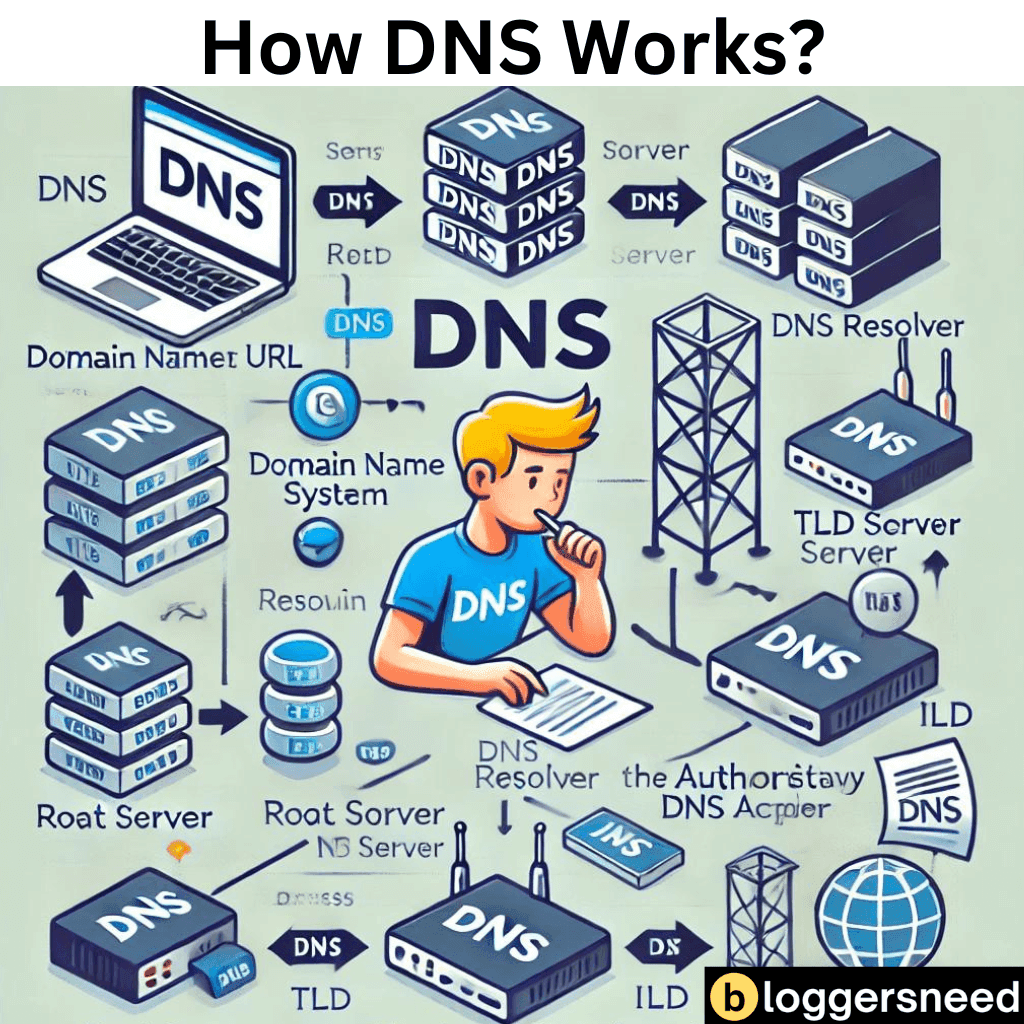
You need a Domain Name System (DNS) because it makes the internet easy to navigate by translating human-readable domain names into the machine-friendly IP addresses computers understand.
This means you can access websites and online services without memorizing IP addresses, which are complex and difficult to remember.
For instance, remembering the IP address 192.0.2.100 for youtube.com would be impractical without DNS.
DNS guarantees that when you type a domain name, your browser connects you to the right IP address.
Without DNS, the internet would be difficult to use, making it essential for seamless online communication and enhancing your online experience.
Table of Contents
What is Domain Name System (DNS)?
The Domain Name System (DNS) is a hierarchical and decentralized naming system that translates human-readable domain names into the numerical IP addresses used by networked devices to communicate with each other over the internet. It acts as a phonebook for the internet, allowing users to access websites and online resources by simply typing in memorable domain names instead of complex IP addresses.
What Are the Fundamental Functions of DNS?
The Domain Name System (DNS) operates through a combination of servers to match domain names with IP addresses. When you enter a domain name into your browser, DNS seamlessly translates it into the corresponding IP address.
This process relies on four types of servers: recursive DNS servers, root name servers, top-level domain name servers, and authoritative name servers.
For example, when you enter ‘youtube.com’ into your browser, the DNS translates it into the IP address ‘192.0.2.100.’ This translation enables the user to access the website efficiently without needing to memorize the IP address.
What Are the Technical Workings of DNS?
When you enter a website’s domain name into your browser, DNS servers immediately kick in, converting that name into a machine-readable IP address through a multi-step process involving recursive resolvers, root servers, TLD servers, and authoritative servers.

In this process, the domain name system (DNS) acts like a phonebook for the internet, mapping human-readable domain names to numerical IP addresses. DNS guarantees that the IP address of the requested domain is resolved, enabling the webpage to load.
DNS resolution occurs through a hierarchy of servers, which typically follow these steps:
- Recursive Resolver: The recursive resolver receives the website URL and resolves the IP address. If it has the address cached, it returns it immediately; otherwise, it queries other servers.
- Root Server: The recursive resolver queries the root server, which redirects it to the next relevant server.
- Top-Level Domain (TLD): The query is forwarded to the TLD server, which redirects it to the appropriate authoritative server.
- Authoritative Server: This final server contains the DNS records and provides the associated IP address for the requested domain.
This entire process typically takes a fraction of a second and is usually imperceptible to the user. Caching of DNS records at various stages in the process helps speed up subsequent queries.
What Is the Importance of DNS in Modern Applications and Technologies?
To guarantee efficient communication and navigation on the internet, DNS plays a fundamental role in attributing human-readable domain names to machine-readable IP addresses in various modern applications and technologies. This process facilitates seamless access to websites, online resources, and services, making the internet user-friendly and efficient. Without the DNS system, memorizing complex IP addresses such as 192.168.1.1 (in IPv4) or 2400:cb00:2048:1::c629:d7a2 (in IPv6) would be a necessary but challenging task.
In practice, DNS allows users to access internet services using domain names like nytimes.com or espn.com instead of memorizing IP addresses. This feature ensures that changes to IP addresses don’t affect users, as the DNS service can update IP information without disrupting access.
Moreover, the backbone of DNS, the recursive resolver, handles the process behind the scenes, ensuring quick and efficient data retrieval by caching DNS records close to requesting clients. To further streamline the process, modern web browsers cache DNS records for a set amount of time. For example, in Chrome, users can view the status of their DNS cache by visiting chrome://net-internals/#dns.
Additionally, operating system-level DNS resolvers and ISP-based DNS services all collaborate to translate human-readable domain names into IP addresses efficiently.
What Is the Future of DNS and What Are the Emerging Trends?
Looking ahead, the future of DNS is expected to involve significant advancements in technology and infrastructure to accommodate the rapidly growing online landscape. Emerging trends include the integration of DNS over HTTPS (DoH) for better privacy, which will encrypt DNS requests and responses to protect against snooping and tampering.
The use of DNS-based security protocols will enhance network protection by blocking access to malicious domains, whitelisting approved sites, and maintaining user privacy. Additionally, DNS security software is poised for substantial growth, with a projected Compound Annual Growth Rate (CAGR) of 9.2% between 2020 and 2025.
The expansion of the commonly accessed scope of DNS will continue, with increased adoption of DNS security solutions expected among individual users, particularly with the rise of remote work, which has seen 30% of companies offering remote work access for the first time due to the pandemic. As consumer awareness of DNS security grows, market demands for robust DNS security solutions will increase.
Other notable trends include a shift towards cloud-based platforms, which will provide greater flexibility for clients to control their DNS performance and improve user experience globally. The adoption of DNSSEC, which adds digital signatures to DNS data, will become more widespread as a security mechanism to protect against cyber threats like man-in-the-middle attacks.
Furthermore, short and memorable domain names are becoming more popular, making them easier for users to remember and use frequently. These advancements will guarantee that DNS remains a critical component of modern networking infrastructure, ensuring a robust and secure online environment.
What Are the Frequently Asked Questions About DNS?
As you read about Domain Name Systems (DNS), you probably have several questions regarding its functionality and various aspects.
Some common questions revolve around understanding DNS resolution processes, types of DNS servers, and DNS security.
Do You Need a Domain Name for a Website?
Yes, every website requires a domain name and you can buy from reputable domain registrar. A domain name enables users to access your website using a memorable address instead of a complex IP address. For instance, users can access Google’s website by typing “google.com” in their browser rather than its IP address, such as “142.250.184.196.” This enhances your website’s professional image and aids search engine optimization (SEO).
The domain name represents your brand and is a crucial element of your website’s identity, similar to how a street address identifies your physical location.
What Happens if a DNS Server Fails?
What happens if a DNS server fails is a critical issue, as it can disrupt communication between users and the websites they try to access.
If a DNS server fails, it can’t provide the necessary IP addresses for domain names, effectively making websites inaccessible until the DNS server is restored or an alternative is found.
For instance, if the DNS server serving a popular website like forbes.com fails, users will encounter an error message saying ‘DNS server not responding’ or ‘DNS server not available,’ equivalent to dialing a phone number and getting a busy signal.
Can I Access Websites Without DNS?
Yes, you can access websites without DNS by directly using their IP addresses instead of their domain names. However, this approach isn’t always straightforward, particularly if the server configuration doesn’t support direct IP access.
Do I Need a Domain Name for Email?
Yes, you need a domain name for email if you want a professional address like yourname@yourbusiness.com. Without a domain name, your email will look less credible, like yourname@gmail.com.
Affiliate Disclosure: Some of the links in this post are affiliate links, which means I may earn a small commission if you make a purchase through those links. This comes at no extra cost to you. Thank you for your support!
